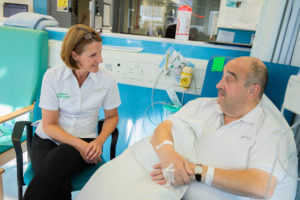Skin Cancer
On this page:

There are two main types of skin cancer: Melanoma and non-melanoma skin cancer.
Non-melanoma skin cancers include basal cell carcinoma and squamous cell carcinoma.
These cancers have a high cure rate and can be managed surgically or non-surgically.
Melanomas start in cells known as melanocytes and are less common but more serious than non-melanoma skin cancers. These have the potential to spread and can be fatal. These are managed surgically.
Skin cancers tend to occur in sun-damaged skin.
What are the symptoms?
Symptoms of melanoma include a change to a mole, freckle, or patch of normal skin. Changes include itching, bleeding, crusting, and inflammation.
Changes in size, shape, colour and the development of asymmetry can be early warning signs.
Melanomas can also occur under the nails, on the palms of the hands or soles of the feet, and in non-sun-exposed sites.
Early surgical removal is key to preventing the spread via the lymph nodes to the rest of the body.
Basal cell carcinomas tend to present as a slow-growing, non-healing area which may bleed and crust repeatedly over months to years. They are often referred to as shiny or pearly lumps with very fine blood vessels on the surface. If left untreated, they can ulcerate but only invade the local tissue. For this reason, they are sometimes called rodent ulcers. They rarely spread around the body.
Squamous cell carcinomas tend to present as crusty lesions that multiply and can become tender over weeks to months. They may initially look like a viral wart or a small ‘horn’ before progressing into a firm lump. If left untreated, they can spread via the lymph nodes to the rest of the body.
Do I need any tests to confirm the diagnosis?
Non-melanoma skin cancers have a characteristic appearance, which can be confirmed with a diagnostic biopsy.
Melanomas can be confirmed by complete excision.
In some cases, an incision biopsy is preferable.
What treatments are available?
Non-melanoma skin cancers can be managed surgically and non-surgically by dermatologists, plastic surgeons, and radiotherapy doctors.
At St George’s Hospital, multidisciplinary clinics manage these patients.
Melanomas are managed surgically by Dermatologists initially and Plastics Surgeons subsequently.
If the melanoma has spread to the lymph nodes and beyond, the patients are managed in a multidisciplinary setting and offered surgery, oncology, or radiotherapy.
All patients diagnosed with skin cancer see a Macmillan nurse and are given relevant information about their illness and contact details of their keyworker.
Is there anything I can do to help myself?
The risk of developing skin cancer is related to several factors.
Exposure to too much ultraviolet light increases your risk; Avoiding sun damage or sunburn reduces the risk. It is essential to be careful when in the sun and wear sunscreen. Sunburn in childhood should be avoided.
Research shows that sunbeds are a cause of melanoma and should be avoided.
Patients with many moles have a higher risk of melanoma than those with fewer than 15 moles.
A weakened immune system is likely to predispose you to skin cancer.
What is Personalised Cancer Care?
Personalised Cancer Care means your team will support you to take an active role in your cancer care by giving choices and control based on what matters most.
Together with your key workers’ team, like your Clinical Nurse Specialist and Macmillan Support worker, we will aim to help you access the care and support that meets your individual needs from the moment you receive your cancer diagnosis so that you can live as full, healthy and active a life as possible.
You will be invited to complete a Holistic Needs Assessment (HNA) to identify any concerns you may have when you have been diagnosed with cancer. These concerns may be physical, emotional, practical, financial and spiritual.
You will answer a simple set of questions or fill in a checklist about all areas of your life. It is to find out about the concerns you may have. You are often asked to rate how important these concerns are to you. It could help you decide what to discuss first during the assessment.
Once you have completed the assessment, your Clinical Nurse Specialist will discuss your needs, maybe face-to-face in a clinic or over the phone. During the discussion, you and your Clinical Nurse Specialist will agree on the best ways to manage your needs and concerns. They will write down what you have decided in a document called a care plan. They may write it during the discussion. Or they may make notes and send them to you afterwards. Your care plan will record the following:
- The main concerns you talked about
- Suggestions and actions to help you manage your concerns
- Services that may be able to support you, and any referrals that are made
- What is already being done to help – for example, the services you are already using
- Information about who to contact if you need more help
- The details of other health or social care professionals with whom you have agreed to share the information.
You may not wish to complete the holistic needs assessment at this time. The care you receive will not be affected in any way, and we will be happy to discuss this again in the future
Health and wellbeing information and support also include:
- Access to the Macmillan Information & Support Centre to find out what support is available in the community, e.g., practical, financial, and how to access it
- Help with understanding cancer and its treatment and how to manage its impact through videos and workshops run by healthcare professionals at St George’s and in the community.
- Attend wellbeing activities which are great opportunities for you and your carers to get together with others affected by cancer.

